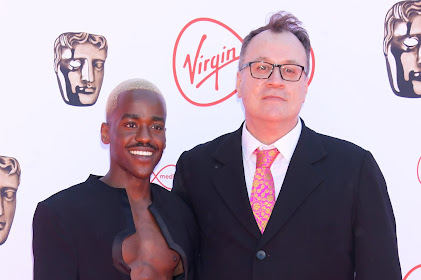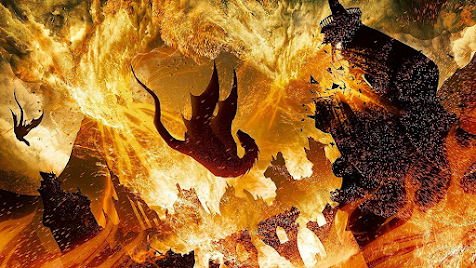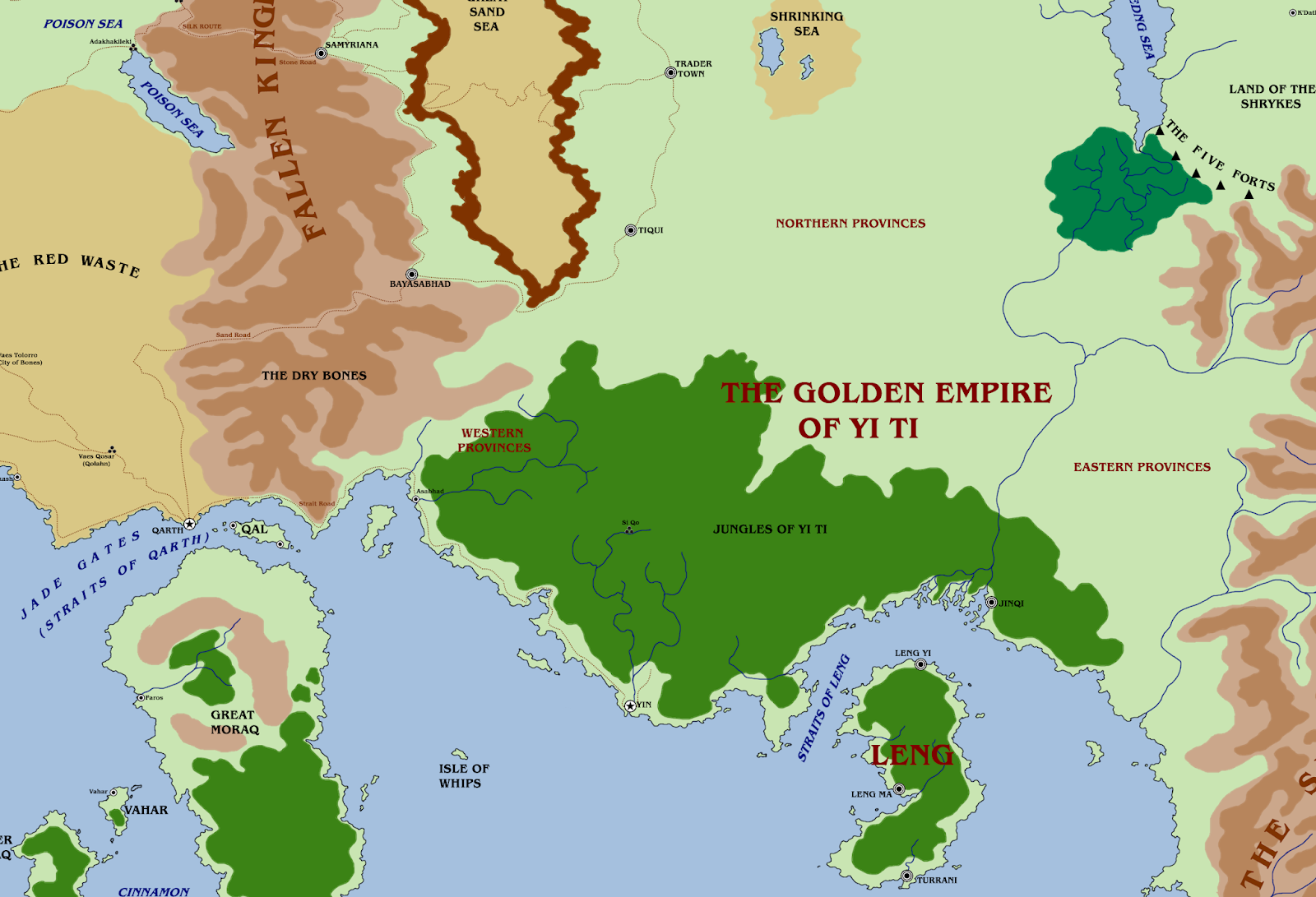In 2007, BioWare released their science fiction roleplaying video game
Mass Effect, the first in a proposed trilogy. The game sold well and was critically acclaimed, for its intricate worldbuilding, great characters and solid storytelling. However, its gameplay was not as well-received, and after BioWare were acquired by uber-publishers Electronic Arts, there was a marked shift in the development of the second and third games in the series. The intricate worldbuilding and strong story focus were diminished, and instead there was more focus and emphasis on action set-pieces, stronger combat and character side-stories. These changes were well-received by many (
Mass Effect 2 and
3 outsold the first game comprehensively) but some noted a significant decline in the plot logic as the series as it progressed, culminating in what is still one of the most controversial endings in video game history.
Video game critic Shamus Young (who sadly passed away a few weeks ago) spent a lot of his time on his Twenty-Sided blog critiquing the role of storytelling in video games, and how storytelling, worldbuilding and characterisation are integrated with gameplay. Many games de-emphasise their stories, using them as bare excuses for why you as the player now have to go and kill people or monsters. But roleplaying games like the Mass Effect series live by their stories, since they provide the impetus for what you do and why you are doing it. Sometimes, your character has to make major decisions that impact on the fate of thousands or millions of people, and your understanding of the world determine what decisions you make.
Young's analysis of the Mass Effect series starts with the acknowledgement that the first game in the series was unusual in how well it set up and executed its story, establishing a cast of memorable, colorful characters (Garrus, Wrex, Tali, Liara, Joker and David Anderson are as fine as collection of space adventure friends as you could ever ask far, and Saren and Sovereign as worthy foes) and how it built its space opera world with surprising skill. Mass Effect's worldbuilding is nothing too original - it's about 75% Babylon 5 mixed with 25% of Battlestar Galactica and given a lot of Star Trek-flavoured mixers - but it is executed with superb flair. The races, background history and lore are created and laid out with accomplished skill, and then integrated into the game itself. The genophage isn't just a historical curiosity, but a ongoing, horrendous crisis for the Krogan people and how your character views it may determine whether Wrex is a valued ally or a bitter (and very quickly, dead) foe, or if the entire Krogan race joins the fight against the Reapers or not. The Quarian-Geth conflict isn't an irrelevant footnote from 300 years ago, but a real, ongoing struggle with the fates of millions of sentient beings swinging in the balance.
It's this integration of story, character and worldbuilding with the actual gameplay and story which is Mass Effect's greatest triumph, and Young, argues, an increasingly major problem in the games that follow. Mass Effect 2, infamously, took a hard left turn from where Mass Effect left off and devoted most of its length to a huge side-quest rather than following the storyline from the first game more organically. In the process, Mass Effect 2 made a lot of very strange decisions that, from a story and worldbuilding perspective, verge on the nonsensical (Shepard agreeing to join forces with ultra-violent terrorist organisation Cerberus despite fighting them several times in the prior game; the Illusive Man's plan for dealing with the Collectors not making any sense unless he's already read the game script). What saved Mass Effect 2, and indeed made it many people's favourite game in the series, is the enormously enjoyable "recruiting the Dirty Dozen" mission structure, the superior combat and the excellent characters, and the time the game spends on allowing you to get to know and befriend them, and how the nurturing of these relationships impacts on the "suicide mission" at the end of the game.
Mass Effect 3 is thus left having to get the main story back on track after Mass Effect 2 ignored it, but the process of having to effectively be both Acts II and III of the trilogy in one game, of having to deal with a lot of loose threads from Mass Effect 2 and the fact that Mass Effect 3 had to work both if you'd killed off the entire cast of the second game or not, meant that Mass Effect 3 was under a lot of strain that led to further, compounded story errors. These included: Cerberus being the main enemy for much of the game rather than the Reapers and having apparently inexhaustible resources; a villain in the game coming out of nowhere; the Crucible super-weapon not really getting a lot of development; and the ending being somewhat illogical (and only marginally improved by post-release DLC) and anticlimactic.
Throughout the book, Young notes that these problems are not actually major problems for a huge number of people. The story that the trilogy tells is solid when seen from a distance, the characters are exceptional and many, many individual quests (especially the character-focused side-quests, the Citadel DLC and the major subplots involving the genophage and the Geth/Quarian conflict) are superb. The combat gameplay improves game on game, and the third game introduced a compelling multiplayer mode. Each game tried something new, even if it didn't always work.
However, Young does convincingly argue that the trilogy is uneven when it comes to its storytelling and worldbuilding, and the cut corners and left-field turns the plot makes in the latter two games are systemic problems that frustratingly undo a lot of really good work the first game accomplishes. For example, the first game has two excellent villains (Sovereign and his stooge, Saren) with well-established goals and motivations, and the game has the flexibility for you to help Saren realise he's made a huge mistake and try to make amends. Neither ME2 or ME3 has very good villains at all: the Illusive Man just makes a lot of vague speeches; Kai Leng shows up out of nowhere like a lame cockroach ninja, does nothing and dies; Harbinger likes to "TAKE CONTROL" of enemy puppets in such a way that you've already killed them long before he's a threat; the Catalyst Intelligence (aka Supremely Punchable Starboy) is Captain Vagueness; and even the Archon from Mass Effect: Andromeda is a ranting nobody, less threatening than a 13-year-old on Xbox Live who's fired up on aggression and too much Coca Cola.
Young also spends only a brief period on the ending to the trilogy, noting the commonly-cited issues with it. He's more interested in identifying where the problems emerged earlier on in the story and how they evolved to the point where the trilogy possibly couldn't end in any other way than this kind of disappointment (but does make a few heroic attempts to suggest improvements).
The book intelligently deconstructs the trilogy's storytelling and worldbuilding - and even dives into Andromeda in a lengthy coda - but Young is wary of drawing easy conclusions. He notes that the trilogy's hard left turn coincides with EA buying BioWare and it would be incredibly easy to blame EA's more corporate, profit-seeking culture, and in particular the way that it rushed BioWare on developing the second and third games, for the issues that cropped up. But he doesn't think that's the whole problem. Some fans have also cited Drew Karpyshyn departing between Mass Effect 2 and 3 as an issue, but Young also identifies problems in the two games Karpyshyn worked on and very well-executed areas in the two games he did not write, so that's not the entire story either (Karpyshyn's recent AMA where he himself refuted the argument that he was a details and worldbuilding guy, praising others at BioWare for focusing on those areas, is interesting in that regard). Young even defends some changes, noting that the original plan for dark energy to be the main problem in the setting wasn't very well established in the first two games, whilst the AI-organic conflict had at least been present since the first game through the confrontation with the AI on Luna and the Geth/Quarian story elements, and was better integrated into the background.
What I also appreciated about the book was Young's constant proposal of solutions to fix the problems, often within the context of adjusting dialogue in given scenes rather than completely rewriting entire plots (or even games). Way back in the 1990s, a guy named Phil Farrand wrote a series of books called The Nitpicker's Guide, focusing on the Star Trek franchise. In those books he noted that plot holes, weird moments of characterisation and bits where it felt like someone had forgotten a fundamental bit of lore were often things that could be fixed very, very easily with small tweaks rather than sweeping changes and Young often puts that into practice here. He even proposes direct rewrites to important scenes that cleans up motivations and background information.
For a book with such a negative-sounding title, Young approaches the subject with a degree of positivity, informed by his love of the story, the setting and the characters. The only time I felt a degree of negativity overload setting in was during his coverage of Andromeda, where his clear loathing of the game's antagonist feels like it overwhelmed the more positive elements of the game. I also feel his coverage of Andromeda was a bit off the mark in some ways: Young claims that colonialism is not particularly part of the game when in fact you spent a fair bit of the game mediating disputes between the Andromeda Initiative colonists, the rebels who've broken away from them and the alien Angara who are a bit narked off about a hundred thousand people showing upon their doorstep, saying they are friends but can they please have their food and resources and a place to live?
Still, Young makes some excellent points throughout the book on the interface between storytelling, worldbuilding, characters and gameplay, and constantly pays tribute to the Mass Effect series in how well it handles these elements in many areas, only to lose the plot in others. There's a strong vibe here of how a franchise started off with brilliant writing and worldbuilding and gradually degraded in those areas, perhaps not matched by any other video game series (although Fallout fans, I suspect, might want a word).
Mess Effect: A Nitpicker's Guide to the Universe That Fell Apart (****) is a long but mostly engrossing read on an interesting and underrated subject, that of the importance of details and consistency in video game storytelling. You can get the book on-demand from Amazon (which also supports his family) or read
the original blog series on his website.
















